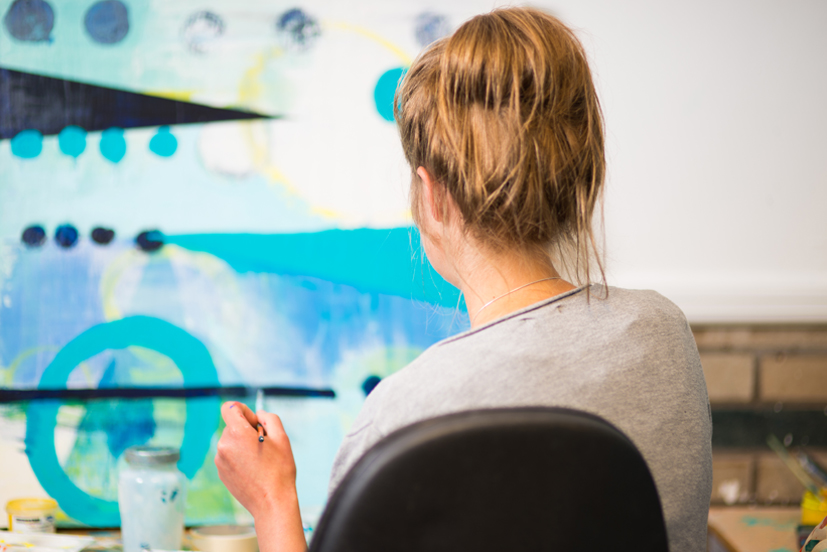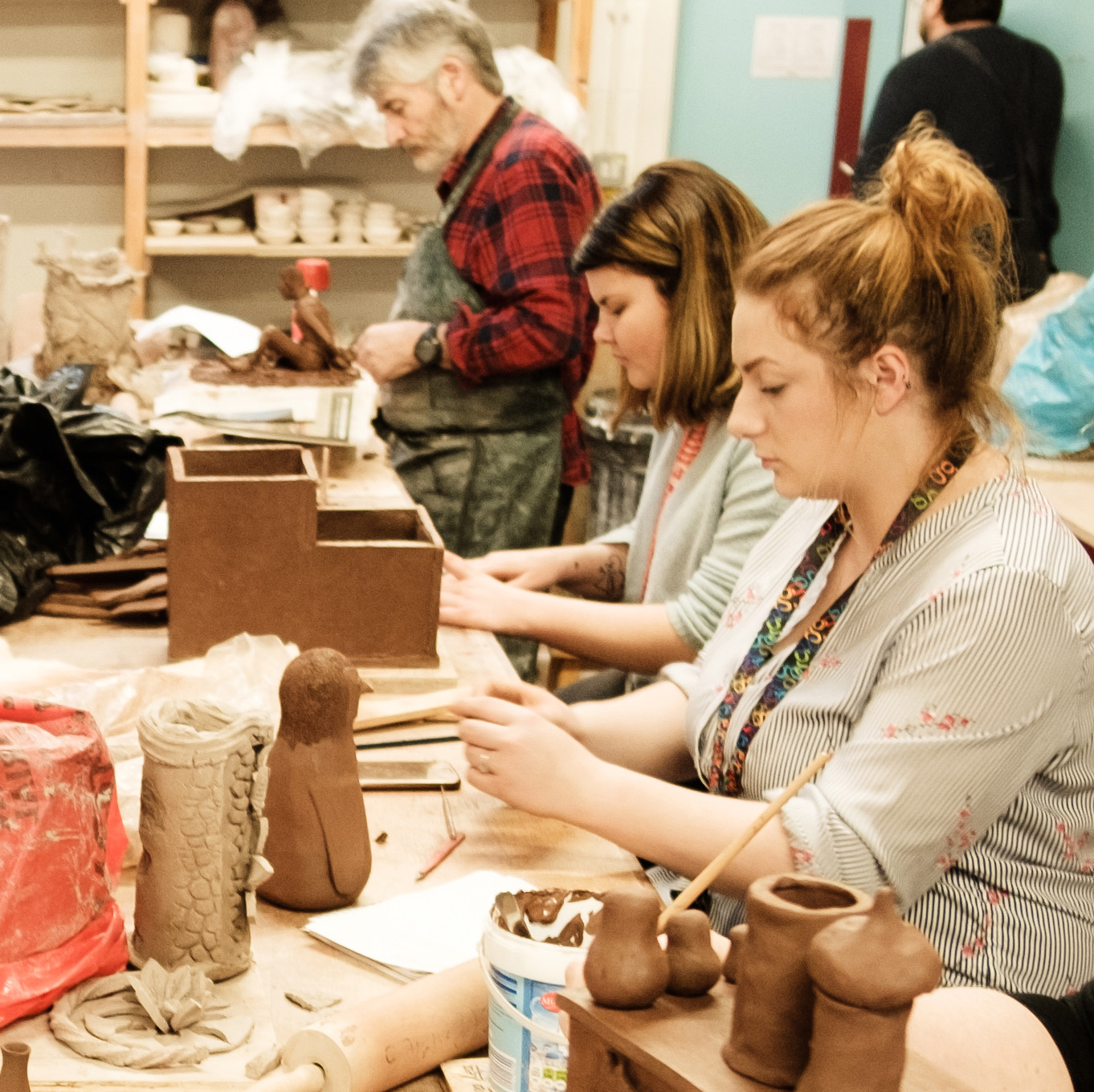BA (Hons) Fine Art

Course details
UCAS Code
W000
Year of entry
2025, 2026
Duration
3 YRS (FT)
UCAS Tariff
96-112
Institution Code
G53
Location
Wrexham
Course Highlights
High-quality
studio space in a traditional art school setting
Joint 2nd
in the UK for Teaching Satisfaction*
Strong links
with galleries and exhibition spaces
Why choose this course?
Explore drawing, painting, sculpture, installation, video and lens-based media and printmaking, and then take the opportunity to specialise, combine areas or to remain broad-based with this open, creative degree.
You will:
- Have opportunities to take on commissions, showcase your work in exhibitions and enter competitions.
- Enjoy professional studio space set within a traditional Art School environment, allowing you to test out ideas through making
- Benefit from strong links with a range of galleries and other exhibition spaces in Wales and the rest of the UK
- Gain knowledge from high profile visiting artists
*This subject area is rated joint 2nd in the UK for Satisfied with Teaching in the Fine Art subject area league table in the Guardian University Guide, 2025.
You can choose to study this course with a foundation year BA (Hons) Fine Art (with Foundation Year) UCAS Code: W100

Art and Designat Wrexham University
Key course features
- We have vibrant studio spaces set within a traditional Art School environment, allowing students to test out ideas through making
- Small group sizes allow for individual support
- Our experienced tutors are passionate about their subjects and regularly produce and exhibit their own work, both nationally and internationally, as well as writing about art practice in books and journals
- We have strong links with a range of galleries and other exhibition spaces in Wales and the rest of the UK
- Opportunities to study abroad or take part in projects with an international dimension
- Showcase your work in an end of year degree show exhibition - Take a look at the Quintesse Degree Show 2024
- Students are encouraged to exhibit their work and to gain knowledge from high-profile visiting artists
What you will study
YEAR 1 (LEVEL 4)
Level 4 of the programme provides a broad base exposing you to diverse learning approaches and art media. The focus is on building core technical skills, conceptual development, contextual grounding, communication abilities and independent practice. This foundation equips students with both practical dexterity and critical thinking to progress in their degree.
MODULES
- Introduction to Fine Art Practice: This module aims to actively shape the student learning environment and foster a sustainable creative practice through exploration in various studio workshops. The module encourages active participation in studio-based events and critical discussions
- The Expanded Studio: This module is designed to foster creative intention and personal practice by exploring various materials, methods, and ideas in specialised fine art studio workshops. You will nurture distinctive creative intentions, exploring unconventional materials, methods, and conceptual directions across drawing, printmaking, painting, sculpture, digital media, performance, and other workshop settings.
- Developing Your Artistic Identity 1: This module will introduce you to a diverse range of career possibilities within and beyond traditional art fields, fostering an understanding of the various pathways available to fine art graduates. It will provide a comprehensive overview of the creative industries, emphasising the diverse opportunities that exist, while also developing your knowledge of how different types of art galleries impact artists and audiences.
- Contexts 1: The primary goal of this module is to familiarise you with a contextual understanding of your subject area. The module aims to introduce you to critical thinking, fostering your ability to engage in critical analysis and structured processes of inquiry. Furthermore, the module seeks to cultivate your curiosity, encouraging you to explore your individual interests within the contexts of art and design history.
YEAR 2 (LEVEL 5)
In this year, the modules will advance your contextual grounding, critical reflection abilities, risk-taking, and communication aptitude. The focus is on evolving a personal visual language and situating practice professionally via public participation.
MODULES
- Situating Fine Art Practice: The aim of the module is to reflect and build upon the skills and knowledge gained in Level 4, encouraging you to extend your individual visual languages and embrace creative risk-taking.
- Developing Fine Art Practice: The aim of this module is to advance your understanding and application of fine art, building upon the concepts introduced in the prerequisite module, "Situating Fine Art Practice." This module focuses on defining and advancing fine art practice, emphasising the placement of work within a broader context.
- Developing Your Artistic Identity 2: The aim of this module is to equip learners with a holistic understanding of the various elements crucial for developing a successful career in the arts. By delving into topics such as selecting opportunities and evaluating their relevance, you will learn to make informed decisions that align with your artistic practice.
- Contexts 2: To enhance your understanding of contemporary art practices, ideas, and debates, the module aims to delve deeper into the subject matter. This involves introducing more intricate contextual frameworks that facilitate the analysis of artworks, practices, and theories within a broader intellectual landscape. The goal of the module is to broaden your knowledge and foster critical thinking and argumentation skills essential for interpreting the complexities of contemporary art contexts.
YEAR 3 (LEVEL 6)
The final year modules stress self-directed explorations culminating in resolved bodies of work, writing to articulate insights, and situating practice professionally via promotions and networks. There is an emphasis on sustaining creative trajectories beyond graduation.
MODULES
- Fine Art Practice as Research: This module empowers you to advance personal creative inquiries through practice-based research and articulate emergent understandings in writing, strengthening speculative art making. Goals include producing ambitious self-guided artworks that synthesise cohesively with contextual insights from sustainable subject exploration.
- Presenting Practice to Audience: This module requires you to create a substantial, self-initiated body of studio work that demonstrates sophisticated conceptualisation and creative application of materials and methods. The outcome of the work is intended for presentation to diverse professional audiences.
The information listed in this section is an overview of the academic content of the programme that will take the form of either core or option modules. Modules are designated as core or option in accordance with professional body requirements and internal academic framework review, so may be subject to change.
Entry requirements & applying
Standard entry requirements for BA (Hons) are 96-112 UCAS Tariff points at GCE A Level or equivalent.
The Fine Art programme team welcomes applications from anyone who can demonstrate a commitment to the subject and the potential to complete their chosen programme successfully. This can be established by showing appropriate academic achievements or by demonstrating that they possess the knowledge and ability equivalent to the academic qualifications.
An admissions tutor considers each application individually. All candidates will either be individually interviewed or invited to an applicants’ day where they will have the opportunity to display a portfolio of their work.
Experience may also be taken into consideration, particularly for those applicants who do not meet the academic requirements above, depending on the extent and depth of subject knowledge.
Teaching & Assessment
The majority of the work is studio/workshop based and practical in nature supported with lectures, talks by specialist guest speakers, demonstrations, tutorials, seminars and critiques. Assessment is continuous, and there are a series of set and chosen, both individual and team, assignments in which students learn a range of skills and techniques and apply them creatively to solve art and design problems.
Assessment is designed to enable students to participate in the measurement of their own progress, with clear aims provided from the very beginning of each module, regular feedback and group interaction with critical analysis throughout the course, giving students the opportunities they need to succeed.
TEACHING AND LEARNING
We offer workshops and support sessions in areas such as academic writing, effective note-making and preparing for assignments.
Students can book appointments with academic skills tutors dedicated to helping deal with the practicalities of university work. Our student support section has more information on the help available.
In terms of particular needs, the University’s Inclusion Services can provide appropriate guidance and support should any students require reasonable adjustments to be made because of a recognised prevailing disability, medical condition, or specific learning difference.
Career prospects
Fine Art, like all of our Art and Design undergraduate programmes, has a strong vocational and academic ethos that aims to ensure graduates acquire a range of vocationally relevant skills. Integral to this ethos is the responsibility to ensure that our graduates have a portfolio of abilities and attributes which will allow them to thrive in the 21st Century workplace. It takes into account the fact that the future needs of the creative industries are likely to be very different and aims to prepare ‘independent learners’ who, on completion of their studies, are able to flourish within increasingly diverse professional contexts.
We pride ourselves on the high level of realistic and practical experience of working in the professional creative environment that you can gain while you are on the programme. Students are encouraged to initiate, organise and participate in off-site projects and engage in professional opportunities, including commercial activities that have the potential to launch their career in Fine Art.
Many Fine Art graduates go on pursue careers in:
- Independent art practice
- Fine art conservation
- Teaching in further or higher education
- Teaching in primary and secondary schools
- Gallery or other forms of exhibition work
- Public or community arts
- Education officers
- Art therapists
- Researchers
- Artist agents
- Technicians
- Arts management
Our dedicated Careers and Employability team is committed to helping you achieve your professional goals. They provide personalised advice, useful resources, and extracurricular employability events to prepare you for the job market.
Fees & funding
You do not have to pay your tuition fees upfront.
The fees you pay and the support available will depend on a number of different factors. Full information can be found on our fees & finance pages. You will also find information about what your fees include in the fee FAQs.
All fees are subject to any changes in government policy, view our undergraduate fees.
For international students looking to study this course please see our international fees.
Programme specification
You can see the full programme specification here.Accommodation
At Wrexham University, we offer on-campus en-suite rooms within our Wrexham Student Village. These private, fully furnished spaces are conveniently located, providing easy access to campus facilities, study areas, and social spaces. Plus, you’re just a 10-minute walk from the city centre!
With all bills included, free Wi-Fi, 24/7 security, and large social areas, you’ll find everything you need for a great student experience.
Explore our student accommodation options to find your perfect home away from home.
Subject to re-validation
As part of its continuous quality assurance and enhancement, the University reviews its courses on a regular basis to ensure that they reflect the needs of students and employers. Periodic review of the existing programmes is required every five years and major changes may be made to the programmes during the re-validation process. As soon as the programmes are re-validated the details of the course will be confirmed. The majority of courses that are still ‘subject to re-validation’ are approved by the validation process; however, this is not guaranteed and should the course not go ahead as planned, or be significantly amended, you will be informed by the university and assistance will be provided to those who have been offered a place to find a suitable alternative course either at Wrexham University or at another provider.
International
This course is open to international students, for information about the university’s entry requirements for EU/international students, please visit our international section.
